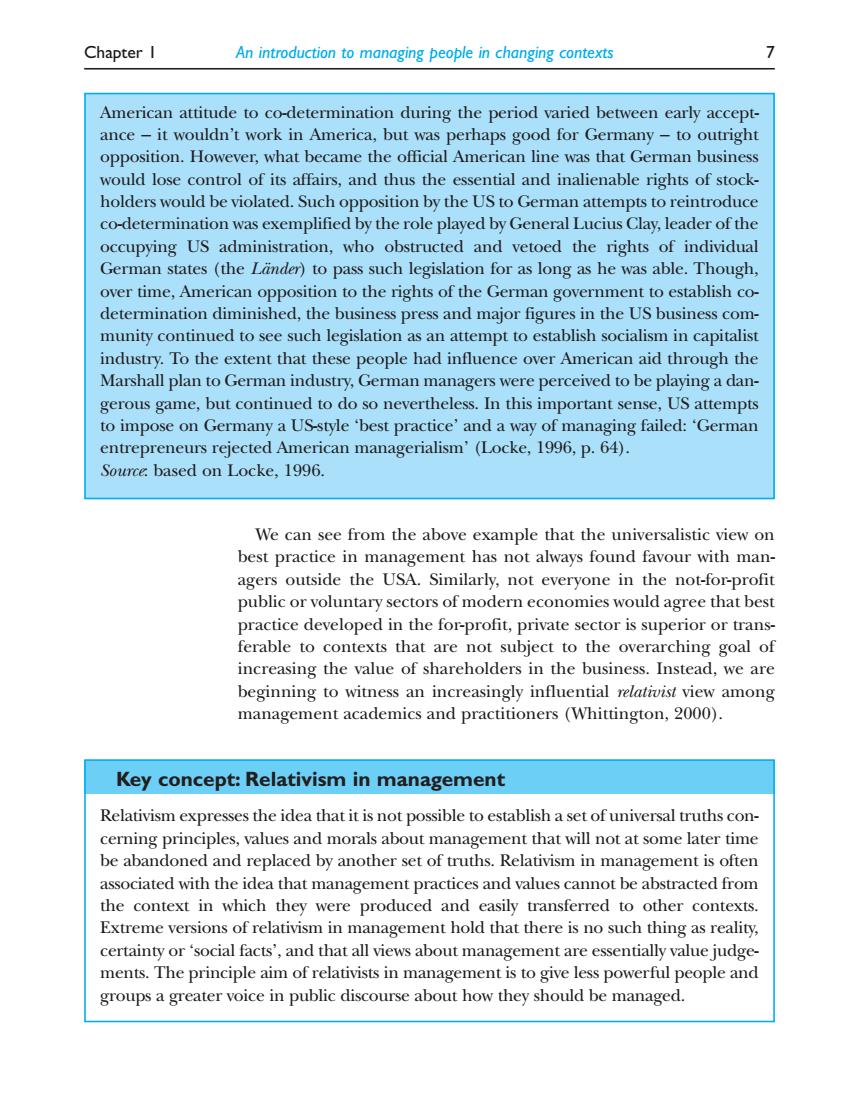正在加载图片...

Chapter I An introduction to managing people in changing contexts American attitude to co-determination during the period varied between early accept ance-it wouldn't work in America,but was perhaps good for Germany-to outright opposition.However,what became the official American line was that German business would lose control of its affairs,and thus the essential and inalienable rights of stock- holders would be violated.Such opposition by the US to German attempts to reintroduce co-determination was exemplified by the role played by General Lucius Clay,leader of the occupying US administration,who obstructed and vetoed the rights of individual German states(the Lander)to pass such legislation for as long as he was able.Though over time,American opposition to the rights of the German government to establish co- determination diminished,the business press and major figures in the US business com munity continued to see such legislation as an attempt to establish socialism in capitalist industry.To the extent that these people had influence over American aid through the Marshall plan to German industry,German managers were perceived to be playing a dan- gerous game,but continued to do so nevertheless.In this important sense,US attempts to impose on Germany a US-style 'best practice'and a way of managing failed:'German entrepreneurs rejected American managerialism'(Locke,1996,p.64) Source.based on Locke,1996. We can see from the above example that the universalistic view on best practice in management has not always found favour with man- agers outside the USA.Similarly,not everyone in the not-for-profit public or voluntary sectors of modern economies would agree that best increasing the value of shareholders in the business.Instead,we are beginning to witness an increasingly influential relativist view among management academics and practitioners(Whittington,2000) Key concept:Relativism in management Relativism expresses the idea that it is not possible to establish a set of universal truths con cerning principles,values and morals about management that will not at some later time be abandoned and replaced by another set of truths.Relativism in management is often associated with the idea that management practices and values cannot be abstracted from the context in which thev were produced and easily transferred to other contexts Extreme versions of relativism in management hold that there is no such thing as reality certainty or'social facts',and that all views about management are essentially value judge ments.The principle aim of relativists in management is to give less powerful people and groups a greater voice in public discourse about how they should be managed.We can see from the above example that the universalistic view on best practice in management has not always found favour with managers outside the USA. Similarly, not everyone in the not-for-profit public or voluntary sectors of modern economies would agree that best practice developed in the for-profit, private sector is superior or transferable to contexts that are not subject to the overarching goal of increasing the value of shareholders in the business. Instead, we are beginning to witness an increasingly influential relativist view among management academics and practitioners (Whittington, 2000). Chapter 1 An introduction to managing people in changing contexts 7 American attitude to co-determination during the period varied between early acceptance – it wouldn’t work in America, but was perhaps good for Germany – to outright opposition. However, what became the official American line was that German business would lose control of its affairs, and thus the essential and inalienable rights of stockholders would be violated. Such opposition by the US to German attempts to reintroduce co-determination was exemplified by the role played by General Lucius Clay, leader of the occupying US administration, who obstructed and vetoed the rights of individual German states (the Länder) to pass such legislation for as long as he was able. Though, over time, American opposition to the rights of the German government to establish codetermination diminished, the business press and major figures in the US business community continued to see such legislation as an attempt to establish socialism in capitalist industry. To the extent that these people had influence over American aid through the Marshall plan to German industry, German managers were perceived to be playing a dangerous game, but continued to do so nevertheless. In this important sense, US attempts to impose on Germany a US-style ‘best practice’ and a way of managing failed: ‘German entrepreneurs rejected American managerialism’ (Locke, 1996, p. 64). Source: based on Locke, 1996. Key concept: Relativism in management Relativism expresses the idea that it is not possible to establish a set of universal truths concerning principles, values and morals about management that will not at some later time be abandoned and replaced by another set of truths. Relativism in management is often associated with the idea that management practices and values cannot be abstracted from the context in which they were produced and easily transferred to other contexts. Extreme versions of relativism in management hold that there is no such thing as reality, certainty or ‘social facts’, and that all views about management are essentially value judgements. The principle aim of relativists in management is to give less powerful people and groups a greater voice in public discourse about how they should be managed